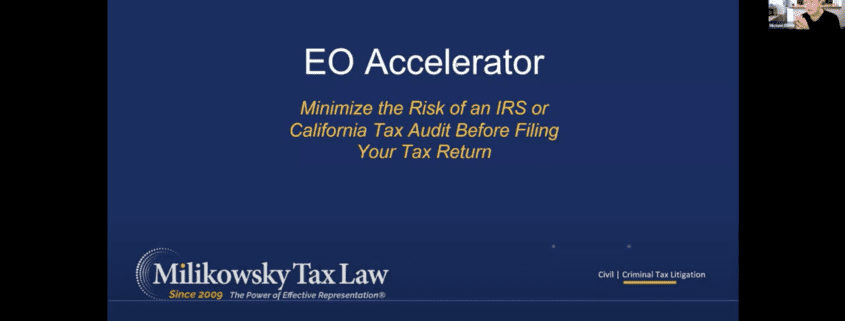Minimize the Risk of an IRS or CA Tax Audit
EO Lunch & Learn: Minimize the Risk of an IRS or California Tax Audit Before Filing Your Tax Return
“The hardest thing in the world to understand is the income tax.” — Albert Einstein
Founder, John Milikowsky presents to the EO Accelerator group on common red flags, tax filing do’s and don’ts and your AB-5 1099 contractor verifications.
“The hardest thing in the world to understand is the income tax.” — Albert Einstein, physicist
John Milikowsky is the Founder and Managing Attorney at Milikowsky Tax Law.
Before founding his practice, John was a small-business owner for 20 years. Having been in the small business owner’s shoes, John is passionate about advocating for business owners and has defended over 300 companies in tax audits and other tax matters before IRS and California tax agencies. John is especially proud of his proposal to IRS, U.S. treasury, and Congressional Sub Committee staff members to abate penalties for taxpayers.
In 2016, John Milikowsky was voted the top three tax attorneys in San Diego by the Union Tribune Reader’s Poll. On his free time, John enjoys spending time with his wife and three kids and engaging in sports including cycling and competitive swimming.
THREE THINGS TO DO Before filing your tax return:
Verify business income: Pull your bank statements & complete a bank deposit analysis to verify income.
Review your general ledger: go through each expense category – verify expenses were properly categorized and personal expenses are not being deducted (i.e. artwork for the office or personal vacation).
Identify complex transactions: review IRS’ website for listed or reportable transactions. You may need to disclose the specific transaction on a separate form.
Who & What is IRS currently focusing on?
High earners, non-filers
Tax shelters
CASE STUDY 1
Family owned operating company opens two new LLCs and establishes a pension in each LLC.
A family business operated a legitimate manufacturing company (an S corp). Their CPA advised them to open a two additional LLCs (a management company and a finance company) to allow the owners to create two pensions where each LLC would receive large payments each year from the main operating company and take a deduction to avoid paying any income tax.
IRS believed this was a tax shelter and opened a 5 year audit. They also assessed approximately $2M in taxes and penalties/interest.
To defend the company and two shareholders, we had to establish two things: 1) the two companies and their respective pensions were not set up purely for tax purposes – in other words, their must be a real “business purpose” to establish two companies and two pensions. 2) The two pensions (in how they were established and funded) were legitimate.
How IRS selects a return for audit
IRS created and uses an algorithm called “Discriminant Function System” (DIF) score that rates the potential for change, based on past IRS experience with similar returns.
The Unreported Income DIF (UIDIF) score rates the return for the potential of unreported income.
OTHER COMMON MISTAKES:
Unreported income (BDA may reveal additional income).
Reporting an amount for “Commissions and Fees” or “Contract Labor” where no 1099s were issued by your company
RED FLAGS that you are under criminal investigation:
You are contacted in person or by phone by an IRS Criminal Investigator (CI).
You received large amounts of cash or wires into your company bank account. Then IRS opens an audit and the auditor is part of the “Abusive Transactions & Technical Issues” group or “Fraud Unit.”
The audit opens an audit and then goes dark or the auditor starts interviewing your neighbors and business associates.
IRS opens an audit that covers 5 years.
California AB-5 Independent Contractor Test:
Borrello 13 factors (CA and many other states)
20 factor test (IRS)
California Law changed in January 1, 2020: AB5 (requires satisfying all 3 elements):
1. Hiring company has no directed control over the worker.
2. Worker performs work outside of the hiring company’s usual course of business (core business function).
3. Worker is engaged in an independent trade/business and actually provides services in that trade/business.
CA Estimates additional taxes from AB5 = $7 BILLION
Before hiring 1099 contractors:
Verify they have a valid trade or business.
We have a product called www.Clear1099.com that produces business reports for companies to verify the elements of a true business and the services offered (essentially elements B and C of the ABC test).
3 things not to do:
Do not convert 1099 contractors mid-year (or mid-quarter) because the same worker will get both a 1099 and W2 for that year.
Do not have 1099 contractors performing the same work as employees.
Do not have 1099 contractors performing “licensed work” without a license i.e. construction.
Tips to respond to an EDD auditor
Review all your 1099s and accounting records (payments to third-parties for services) to confirm whether each individual satisfies AB5 (or Borrello – pre 2020) as an 1099 contractor.
TIPS TO MINIMIZE Taxes:
Analyze whether a C corporation or S corporation is a better structure.
Having an LLC – owners working for the company do not require to be on payroll.
Establish a company retirement plan to defer income.



